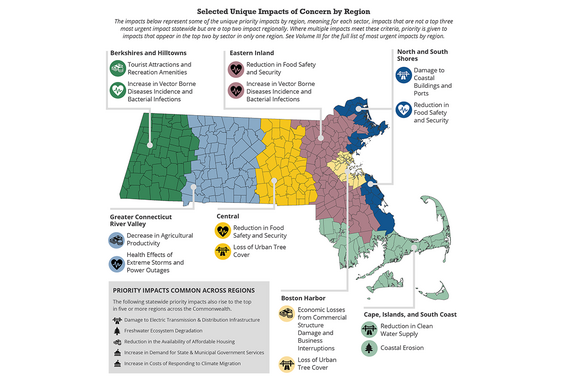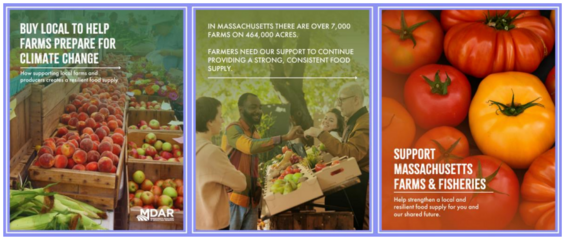What is Climate Change?
Climate change is a long term shift in the climate, including temperatures and weather patterns.
Climate change can be caused by natural changes in the environment and/or through human activities due to the burning of fossil fuels.
What are MDAR's Goals
The ResilientMass Plan is Massachusetts' State Hazard Mitigation and Climate Adaptation Plan. It aims to ensure the Commonwealth is prepared to withstand, rapidly recover from, adapt to, and mitigate natural hazard events. Learn more about ResilientMass.
Track the progress made on MDAR-specific goals! Filter program by “Lead Agency”.

Image from MA Climate Change Assessment.
What Can I Do?
How Can I Help Pollinators?
Supporting pollinators is a bee-utiful thing
Climate change can be harmful to bees and other pollinators that are essential members of our ecosystem. Cranberries, an important crop here in Massachusetts, rely on bees and other pollinators for production. You can make a difference in your own yard by planting a pollinator-friendly garden with native flowers.
Bumble Bouquet Options
- Swamp milkweed
- Thread-leaved tickseed
- Red columbine
- New England aster
- Blazing star
Find more information on pollinators and planting through our partnership with #GrowingWild.

Massachusetts Farmers Are Climate Heroes
Climate tech promotes a healthier climate
Many farms across the Commonwealth have implemented solar and smart tech projects. The use of climate-smart technology results in increased resource efficiency, including water savings and fertilizer and energy reductions.
Here are some ways Massachusetts farmers stay #climatesmart:
- Renewable energy projects
- Rainwater harvesting
- No-till farming to improve soil fertility
- Composting systems to reduce farm waste
Farmers who use climate smart tech are climate heroes! Ask your local farmers how they use climate smart tech on your next visit.
Buy Local to Support Local Farms
Buying local supports Massachusetts farmers and the climate
Why local? A strong local food system means a consistent food supply. Despite constant climate change, farmers are adapting and making local agriculture even stronger. Small changes make a big difference, visit local farms and farmers markets in routine grocery runs to color your plate with Massachusetts products and crops.
Support Massachusetts Grown… and Fresher! by visiting the MassGrown map to find farmers markets and farms in your neighborhood.

Food Waste and Composting
Compost: the ‘waste’ we don’t waste
Here’s how compost supports a heathier climate:
- Overall reduction of waste
- Enhancement of soil health
- Sequesters carbon in soil
- Improves water holding capacity for crops
- Reduces erosion
Massachusetts farms compost organic material so it can be applied to the soil, encouraging healthy and productive crops. Support Massachusetts farms by purchasing local produce and through participation in compost programs on a small-scale from home.

Reduce Your Carbon Pawprint
Local pet adoption
In 2024 more than 10,000 dogs and 7,000 cats were imported from other parts of the country, while thousands of animals in Massachusetts shelters await their fur-ever home. Don’t just source your produce locally, adopt pets from Mass., too. Think global, adopt local!
Private organizations must be registered with MDAR, ensuring the health and safety of animals being adopted in the Commonwealth. You can find a full list of licensed local shelters and more information on the adoption process on our website.

What Else Can I Do To Take Climate Action?
Learn more on how residents of the Commonwealth can take action to protect communities, save money, and save energy by visiting EEA’s Climate Action Campaign.
Learn more about what farmers' are doing through our Grants Story Map!
Are You a Farmer or Producer?
Check out MDAR’s Climate-Smart Agriculture Grant Program:
This program provides funding for agricultural operations to proactively address risks and strengthen their economic and environmental resiliency, as well projects to increase energy efficiency and renewable energy use.
Or view a full list of MDAR grant programs.
Looking for more Climate Programs?
Get a copy of MDAR’s soon-to-be-launching Climate Resource Handbook to learn about a variety of government programs that can help you take climate action on your operation.
Email MDAR.EJ@Mass.gov for more information.